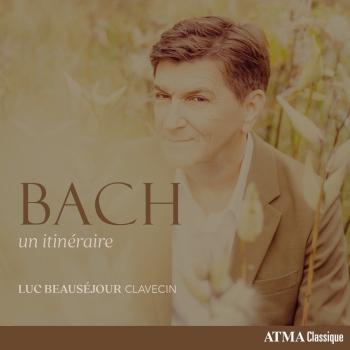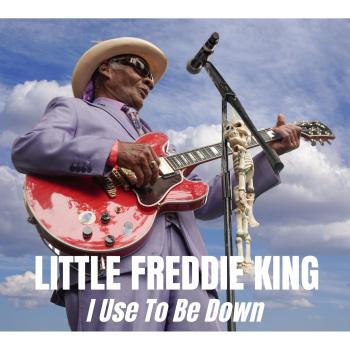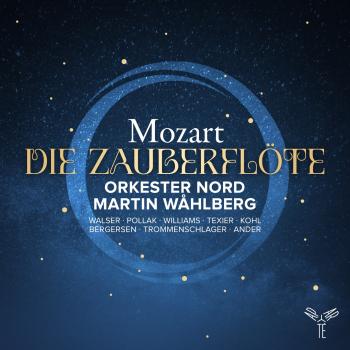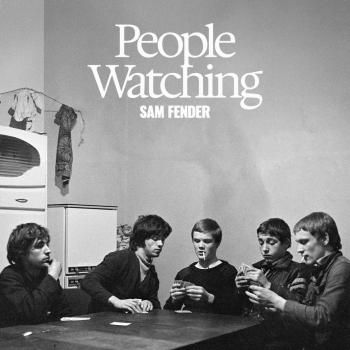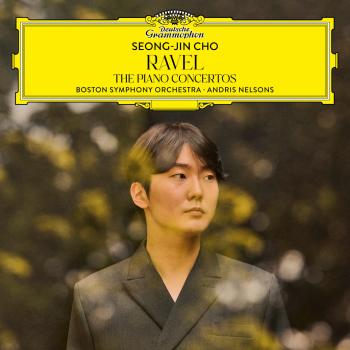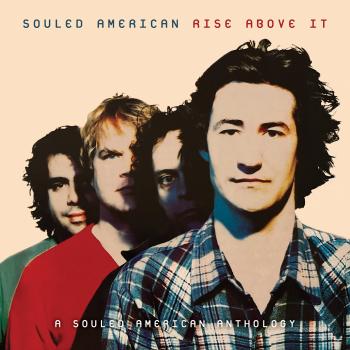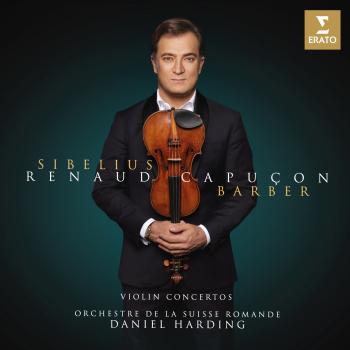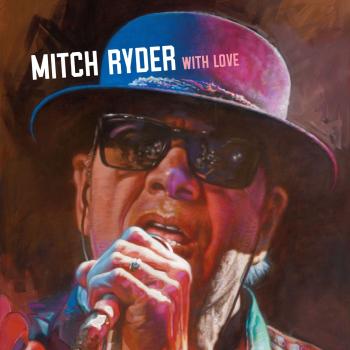
Paisiello: Le gare generose, R 1.71 (Live) Marianna Mappa, Bruno Taddia, Stefano Marchisio, Orchestra del Giovanni Paisiello Festival & Giovanni di Stefano
Album info
Album-Release:
2020
HRA-Release:
13.03.2020
Album including Album cover
- Giovanni Paisiello (1740 - 1816): Le gare generose, R 1.71:
- 1 Le gare generose, R 1.71: Sinfonia (Live) 03:42
- 2 Le gare generose, R 1.71: Dianina (Live) 04:08
- 3 Le gare generose, R 1.71: Quale ti sembra adesso la tua sorte? (Live) 01:58
- 4 Le gare generose, R 1.71: Ti parla un uom candido (Live) 02:56
- 5 Le gare generose, R 1.71: S'ave rutto lo cuollo? (Live) 01:18
- 6 Le gare generose, R 1.71: Scopo, scopo. Netta e spazza (Live) 01:16
- 7 Le gare generose, R 1.71: O bella! Vi ho trovati (Live) 00:38
- 8 Le gare generose, R 1.71: Di padrona porto il nome (Live) 02:14
- 9 Le gare generose, R 1.71: Dunque di buon voler (Live) 01:39
- 10 Le gare generose, R 1.71: Olà! Dico, son padrone (Live) 05:27
- 11 Le gare generose, R 1.71: M'inchino ai miei bellissimi (Live) 02:04
- 12 Le gare generose, R 1.71: In cimento sta il mio core (Live) 03:54
- 13 Le gare generose, R 1.71: Il tuo umore strampalato (Live) 01:22
- 14 Le gare generose, R 1.71: Così destino e voglio (Live) 04:11
- 15 Le gare generose, R 1.71: Basta! Vedrai, birbon (Live) 01:26
- 16 Le gare generose, R 1.71: Quatto, via quatto... Si dice (Live) 03:18
- 17 Le gare generose, R 1.71: Ah, mademoiselle charmante (Live) 00:52
- 18 Le gare generose, R 1.71: Or vedete che imbarazzi (Live) 04:40
- 19 Le gare generose, R 1.71: Col dichiararmi di Dianina sposo (Live) 00:28
- 20 Le gare generose, R 1.71: Miei signor... (Live) 18:58
- 21 Le gare generose, R 1.71: L'italian sta ben messo in catena (Live) 00:53
- 22 Le gare generose, R 1.71: Par che a lei fuggì il colore (Live) 04:10
- 23 Le gare generose, R 1.71: Col moro l'italian venir già veggio (Live) 02:04
- 24 Le gare generose, R 1.71: Chi mi mostra, chi m'addita (Live) 02:33
- 25 Le gare generose, R 1.71: Padron, se veramente volete coltivare (Live) 01:38
- 26 Le gare generose, R 1.71: Temerario ed ardisci (Live) 01:21
- 27 Le gare generose, R 1.71: Ami, lo so, per vezzo (Live) 04:18
- 28 Le gare generose, R 1.71: Allegramente è scatenato l'urzo (Live) 00:42
- 29 Le gare generose, R 1.71: Piche, cornacchie e merli (Live) 03:58
- 30 Le gare generose, R 1.71: Mi consolo! (Live) 05:55
- 31 Le gare generose, R 1.71: Miss Nab, abbiam notizie portentose! (Live) 03:07
- 32 Le gare generose, R 1.71: Cara Gelinda amabile (Live) 04:17
- 33 Le gare generose, R 1.71: Buon che partì quel matto (Live) 01:28
- 34 Le gare generose, R 1.71: Non s'alteri tanto (Live) 04:10
- 35 Le gare generose, R 1.71: Tu ingrato birbone (Live) 03:33
- 36 Le gare generose, R 1.71: Ansiosa sono di saper la sorte (Live) 00:39
- 37 Le gare generose, R 1.71: Qui fermàti, qui celàti (Live) 17:40
Info for Paisiello: Le gare generose, R 1.71 (Live)
Paisiello wrote the music for Le gare generose to be premiered at the Teatro dei Fiorentini in Naples in the spring of 1786. The near-total absence of gags and slapstick routines plus the constant tension experienced by Bastiano and Gelinda who are on the run from alleged debts under false identities, suggest this opera belongs to the semiserio genre. This opera features middle-class characters rather than the usual aristocrats. Paisiello’s score features the arsenal of comic devices he would later employ in La Scuffiara or La Molinara. Music closely reflects the action on stage: in the duet for Bastiano and Gelinda “Scopa, scopa, netta e spazza”, what the violins play resembles the broom sweeping while the couple quarrel; it also reflects the physical nature of the characters and the images in the sung text by employing humorous madrigal-like devices – thus phrasing that rises and falls depicts butterflies in the first aria for Berlicco or a bee in the aria for Gelinda. In the Andante con moto of Finale I when the couple pretend to work while eavesdropping on the conversation between Dull and Berlicco, the orchestral figures at the beginning are intended to resemble the actions “rassettar” and “scopettar”, after which the musical emphasis shifts from action to emotional state – in this case, growing anxiety. Although Gare generose is a strange combination of the comic and the serious, it was remarkably successful. The success of the opera lasted until 1800 on the European circuit and with 37 different stagings, Gare generose is Paisiello’s twelfth most-performed opera.
Marianna Mappa, soprano
Bruno Taddia, baritone
Manuel Amati, tenor
Giulia Mattiello, contralto
Orchestra del Giovanni Paisiello Festival
Giovanni di Stefano, direction
Marianna Mappa
began studying piano at an early age and in 2001 was admitted to the Conservatory of Music “Niccolò Piccinni” in Bari. A winner of several national competitions for piano from 1999 to 2002, she began vocal studies in 2004.
In 2014 she completed her studies in singing and piano at the prestigious Conservatory of Music Giuseppe Verdi in Milan, Italy. In 2011 and 2012 she participated in master classes with Vittorio Terranova. In 2014, on the occasion of Remembrance Day, she performed with the Klezmer Ensemble in Milan, broadcast on Radio Rai3. In December 2018 she received first prize in the Valerio Gentile di Fasano Competition.
She has participated in numerous seminars of music with Gabriele Coen for Klezmer Music, Stelia Doz and Guido Salvetti for vocal Chamber Music, and Francis Keeping for vocal technique. Since 2010 she has perfected her technique with mezzosoprano Manuela Custer. In May of 2015 she participated in the Opera Studio Academy of Santa Cecilia in Rome with Madame Renata Scotto. In 2016-17 was invited to take part in the Placido Domingo Centre de Perfeccionamento at Opera de Valencia in Spain. In 2017-18 she returned to the Valencia Young Artist program. In addition to concerts with Maestro Domingo she performed Miss Jessel in Britten’s The Turn of the Screw, Kate Pinkerton in Madame Butterfly and soprano soloist in a concert performance of Handel’s Israel in Egypt. In addition she covered the roles of Medora in Il Corsaro, Vitellia in La Clemenza di Tito and Ellen Orfurd in Peter Grimes.
Marianna made her professional debut in November 2015 in the role of Musetta in Pavia.
Bruno Taddia
Born in Pavia, graduated in Violin from the Music Conservatory in Genova he studied Voice with Paolo Montarsolo and Composition at the "G. Verdi" Music Conservatory in Milan. He is graduated with honor in Philosophy at the University of Milan. He specialized at the "Accademia Rossiniana" in Pesaro under the guidance of Alberto Zedda, and made his debut as Don Alvaro in Il Viaggio a Reims staged by Emilio Sagi at the 2001 Rossini Opera Festival.
During season 2014/2015, he made his debut Oreste Iphigenie en Tauride by Gluck at the Grand Theatre de Geneve alongside Anna Caterina Antonacci under the direction of Hartmut Haenchen. After his appearence as Figaro (Barber of Seville) at the Bassano Opera Festival, sung Don Parmenione (L’Occasione fa il ladro) at his debut at the Theatre des Champs Elysées under the direction of Maestro Enrique Mazzola, and later, Belcore, Elisir d’amore, at the Rete lirica Marche, Italy. After he sung Don Giovanni at the Piccolo Festival of Trieste and Danilo Danilowitch (Die lustige Witwe by Lehar) at the Teatro Carlo Felice in Genua.
Don Alfonso in Così fan tutte by W.A.Mozart at Opera di Firenze (Maggio musicale fiorentino), Max in Betly by G. Donizetti at Konzerthaus am Gendarmenmarkt, Berlin, Belcore in L'Elisir d'Amore at the Teatro Petruzzelli in Bari, Don Magnifico in La Cenerentola by G. Rossini at Teatro Massimo di Palermo, Ramiro in “L’Heure espagnole” by M. Ravel at the Shanghai Symphony Orchestra, Ciccillo in “Il medico dei pazzi” by G. Battistelli at Teatro la Fenice di Venezia.
During the 2013/14 season he sung the role of Count Almaviva in Le Nozze di Figaro at the opening night of the season 13/14 at the Grand Theatre de Geneve, Malatesta in Donizetti's Don Pasquale at Opera de Oviedo-Campoamor Theatre, Macrobio in La pietra del paragone of Rossini at the Theatre du Chatelet, Paris. Ciccillo in Il medico dei pazzi (world premiere) of G.Battistelli at Opera Nationale Lorraine Nancy, Des Knaben Wunderhorn with the Neue Philharmonie Lausitzer and Don Checco in Don Checco masterpiece of N. De Giosa at the Teatro di San Carlo in Naples.
His recent appearances sees him engaged in the role of Mercury's La Calisto by Cavalli at the Grand Théâtre de Genève, Tiresias in Niobe, Queen of Thebes A. Steffani at the Royal Opera House Covent Garden in London and the Grand Théâtre de la Ville in Luxembourg (2010). It was also appreciated Figaro in The Barber of Seville by Rossini at the Theatre du Chatelet, Paris, gaining huge international success as Punch in Birtwistle's Punch and Judy at the Grand Théâtre in Geneva, standing then as Don Alfonso, Così fan tutte, at Théâtre du Capitole de Toulouse, and Malatesta in Donizetti's Don Pasquale at the Teatro Municipal in Santiago, Chile (2011). The 2012’s season saw him as Maximilian / Captain / Tsar Ivan Candide L.Bernstein at the Teatro dell'Opera in Rome, Pasquale in 'Orlando Paladino’ F.J.Haydn at the Theatre du Chatelet, Paris, Elviro in Xerxes by GF Handel Festival at the Chateau of Versailles, Eisenstein in Die Fledermaus by J.Stauss jr. at the Teatro Bellini in Catania. He opened the Omni Festival 2013 in Luxembourg with a concert for the bicentennial of Verdi’s birth, singing after Lindo in Vivaldi's Tito Manlio at the Theater an der Wien under the baton of O. Dantone.
His experiences includes Le Nozze di Figaro (Conte d'Almaviva), Don Giovanni (title role) in 2009 and Il Turco in Italia (Poeta) in 2010 at the Deutsche Oper am Rhein in Düsseldorf, Haydn's L'Isola Disabitata (Enrico) in Siena under Gianluigi Gelmetti in 2009; Cavalli's La Calisto (Mercurio) at the Grand Théâtre de Genève (april 2010).
After his debut in 2001, he was invited to perform at numerous international theaters and festivals, including: Rossini's La Gazzetta (Don Pomponio) directed by Nobel laureate Dario Fo in at the Gran Teatre del Liceu in Barcelona; Le Convenienze ed Inconvenienze Teatrali (Mamma Agata) at the Dresden Semperoper; Don Pasquale (Malatesta) under the baton of Riccardo Muti at the Ravenna Festival; Donizetti's L'Ajo nell'Imbarazzo (Don Giulio Antiquati) at the Wexford Festival; L'Elisir d'Amore (Dulcamara) at the Teatro Carlo Felice in Genoa and (Belcore) at the Palm Beach Opera; La Cenerentola (Dandini) at the Spoleto Festival USA 2008; Rossini's L'Equivoco Stravagante at the Deutsche Oper Berlin; Gianni Schicchi (title role) and Ponchielli's Il Parlatore Eterno (title role) at the Teatro della Fortuna in Fano; Vacchi's Teneke (Wicked Okçuoglu) at the Teatro alla Scala in Milan; Così Fan Tutte (Don Alfonso) at the Teatro dell'Opera in Rome.
He regularly collaborates with some of today's most distinguished conductors, such as Riccardo Muti, Thomas Hengelbrock, Hartmut Haenchen, Jean Christophe Spinosi, Ottavio Dantone, Roberto Abbado, Antonello Allemandi, Bruno Aprea, Maurizio Barbacini, Daniele Callegari, Massimo De Bernart, Antonino Fogliani, Riccardo Frizza, Romano Gandolfi, Gianluigi Gelmetti, Claire Gibault, Michele Mariotti, Roberto Rizzi Brignoli, Corrado Rovaris, Federico Maria Sardelli, Massimo Zanetti and Alberto Zedda, as well as directors Mario Corradi, Filippo Crivelli, Marco Gandini, Guido De Monticelli, Dario Fo, Alfred Kirchner, Denis Krief, Mario Martone, Damiano Michieletto, Ermanno Olmi, Pier Luigi Pizzi, Tobias Richter, Charles Roubaud and Emilio Sagi.
Manuel Amati
was born in Martina Franca in 1996. He began his musical studies as a tenor at the age of 13 with the soprano Francesca Ruospo. He deepened the study of repertoire and style with Vincenzo Scalera, Roberto Scandiuzzi and Pietro Spagnoli; he is currently studying with Domenico Colaianni. In 2015 Manuel studied at Scuola dell’Opera of Teatro Comunale of Bologna. There he prepared his debut on stage as Borsa in Rigoletto by Giuseppe Verdi at Teatro G. Verdi of Busseto on the occasion of Festival Verdi. In 2016 he performed as Albazar in Il turco in Italia by G. Rossini at Teatro Municipale of Piacenza, Teatro Alighieri of Ravenna, Teatro Comunale L. Pavarotti of Modena and Salzburger Landestheater. In the same year he was Conte Alberto in L’occasione fa il ladro by G. Rossini at Teatro Regio of Parma,he sang as Don Ramiro in a reduction of La Cenerentola by G. Rossini at Teatro Regio of Torino; he was Conte di Almaviva in a reduction of Il barbiere di Siviglia by G. Rossini at Teatro Comunale of Bologna. He took part of the activities of La Fabbrica-Young Artist Program of Teatro dell’Opera of Roma with Riccardo Frizza and Roberto Frontali. He played the role of Conte d’Almaviva for Figaro! Operacamion , a project planned by Teatro dell’Opera of Roma and by Teatro Massimo of Palermo. He joined the role of Tenente in La scuola de’ Gelosi by A. Salieri at Teatro Salieri of Legnago, Teatro Comunale of Belluno, Teatro Marrucino of Chieti, Teatro Ristori of Verona, Teatro Pergolesi of Jesi and Teatro Goldoni of Firenze. From November 2016 to June 2018 Manuel joined of the Academy of Maggio Musicale Fiorentino/Opera di Firenze where he studied with worldwide famous artists such as Alfonso Antoniozzi, Richard Barker, Fiorenza Cedolins, Bruno De Simone, Sonia Ganassi, Chris Merritt, Italo Nunziata and Matteo Pais. He took part of the productions of the Theatre: he was Tamino in a reduction of Die Zauberflöte by W. A. Mozart; he was Don Gaspar in La favorite by G. Donizetti, with the conduction of Fabio Luisi and published in CD and DVD by the record company Dynamic. He played the role of Evandro in Alceste by C. W. Gluck, with Pierluigi Pizzi as director and Federico Maria Sardelli as conductor. He sang Requiem by Mozart and Fantasia corale op. 80 by L. W. Beethoven, conducting Fabio Luisi, published by Maggio Live and by the music magazine Amadeus. He was Conte d’Almaviva in a reduction of Il barbiere di Siviglia by G. Rossini, Pastore II in La Dafne by M. da Gagliano at Buontalenti’s cave-Boboli Gardens with Federico Maria Sardelli as conductor. He performed as Remendado in Carmen by G. Bizet with the conduction of Matteo Beltrami and the direction of Leo Muscato.In May 2016 he sang in a tournée in China at embassies and auditorium in Pechino, Shanghai, Macao, Guangzou, Hong Kong. In 2017 he was Biondello in L’oca del Cairo by W. A. Mozart at Teatro Massimo of Palermo; he was also Conte Bellezza in Le donne vendicate by N. Piccini at Festival della Valle d’Itria of Martina Franca. He performed in Catulli Carmina by C. Orff with the choir of Teatro Petruzzelli at Bari’s Cathedral and at Teatro Comunale of Bologna. In 2018 he sang Thamos, König in Äegypten by W. A. Mozart at Teatro Massimo of Palermo with the conduction of Gabriele Ferro. He debuted the role of Don Ramiro in La Cenerentola by G. Rossini at Teatro Politeama Greco of Lecce and Teatro Verdi of Brindisi. In summer 2018 he took part of Accademia Rossiniana of Pesaro where he studied with Ernesto Palacio, Juan Diego Florez and Franco Fussi. He debuted as Cavalier Belfiore in Il viaggio a Reims by G. Rossini at Teatro Rossini of Pesaro for the Rossini Opera Festival. He also opened Patty Smith’s concert in the same theatre. He debuted as Conte d’Almaviva in Il barbiere di Siviglia by G. Rossini at Teatro Comunale Opera Giocosa of Savona. In 2019 Manuel was cover of the role of Dorvil in La scala di seta of G. Rossini with the direction of Damiano Michieletto at the Royal Opera House of Muscat where he performed also in a concert accompanied by Vincenzo Scalera.He is Frontino in L’equivoco stravagante by G. Rossini at Rossini Opera Festival and Alì in Adina by G. Rossini at Wexford Opera Festival . He did some concert in a Tournée at Kyoto (Kyoto Concert Hall), Nagoya, Tokyo (Yamaha Concert Hall), Saitama (Saitama Arts Center)
This album contains no booklet.

